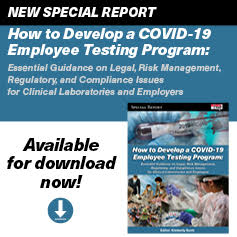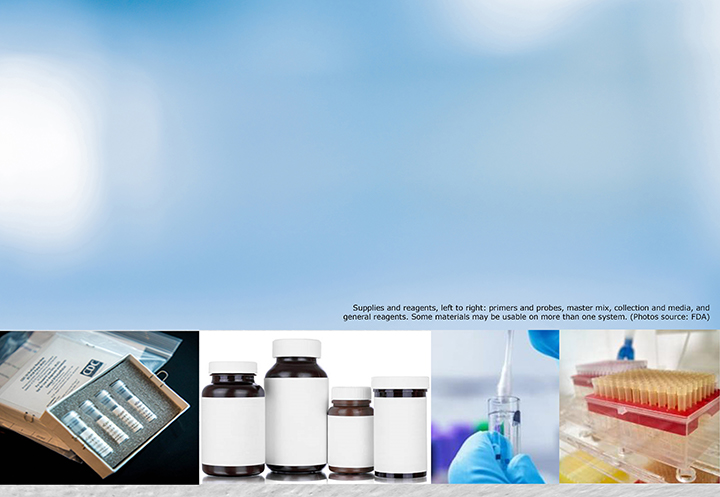New survey shows that supply chain issues for clinical laboratories are starting to affect other clinical diagnostic tests
During the COVID-19 pandemic and the rapid development of SARS-CoV-2 testing options, clinical laboratories have struggled to maintain adequate levels of testing supplies. Supplies such as transport media and nasopharyngeal swabs have, at times, been difficult for many clinical laboratories to obtain. These supply chain shortages have caused bottlenecks and delays nationwide in the implementation of comprehensive and fully accessible COVID-19 testing.
 To better understand the supply chain issues affecting clinical laboratories and the impact these shortages are having, the American Society for Microbiology (ASM) partnered with the Association of Supply Chain Management to develop a survey to provide feedback on clinical laboratory supply issues. Data collection for this survey began Sept. 11, 2020, and concluded Oct. 23, 2020, gathering data from some 122 CLIA-certified laboratories.
To better understand the supply chain issues affecting clinical laboratories and the impact these shortages are having, the American Society for Microbiology (ASM) partnered with the Association of Supply Chain Management to develop a survey to provide feedback on clinical laboratory supply issues. Data collection for this survey began Sept. 11, 2020, and concluded Oct. 23, 2020, gathering data from some 122 CLIA-certified laboratories.
While the ASM clinical laboratory supply survey highlights well-recognized shortages of COVID-19 testing supplies, the survey also reveals a deeper problem that is less recognized: That is, supply chain shortages are impacting many clinical laboratories in their ability to perform non-COVID-19 diagnostic tests.
Highlights of Fall 2020 ASM Survey into Clinical Laboratory Supply Shortages
Several clinical lab testing supply shortages are highlighted by the new ASM survey. Deficits in the resources needed to perform routine bacterial tests, such as strep throat, pneumonia, bronchitis, and urinary tract infections were common, with 56.0% of labs surveyed reporting supply shortages in this area. Supplies for detection and isolation of fungi also have been significantly affected, with 45.5% of labs reporting supply shortages for routine fungal testing. Shortages in routine sexually transmitted infections (STI) testing supplies were also high, with 60.0% of labs reporting shortages.
Clinical laboratories also reported other testing supplies that were short, but not as severely. These included supplies for detection and isolation of parasites (5.0% of labs) and supplies for routine mycobacteria testing (21.1% of labs). Clinical laboratories additionally reported supply shortages for:
- nasopharyngeal swabs (16.0% of labs),

- oropharyngeal swabs (13.0% of labs),
- viral/universal transport media (20.8% of labs), and
- liquid amies (11.8% of labs).
In addition to providing detailed data about non-COVID-19-related supply shortages, the survey also provided insights into COVID-19 laboratory developed test (LDT) and commercial molecular assay testing supply shortages. LDT supply shortages were worst for nucleic acid extraction kits (12.0% of labs), “other consumables” that were not detailed in the survey (27.3% of labs), and synthesized primers and probes (8.3% of labs). The largest shortages for commercial molecular assay testing supplies were commercial testing kits (73.1% of labs) and IVD instruments (31.8% of labs).
Cast Wider Net on Clinical Laboratory Supply Shortages
Until now, clinical laboratory supply chain management issues have narrowly focused on COVID-19 testing supplies, but this new ASM supply chain survey research shows that clinical laboratory leaders may benefit from widening their focus to include other testing supplies needed for non-COVID-related services. In particular, knowledge of the shortage of nasopharyngeal and oropharyngeal swabs will be especially important to consider as flu season begins.
By understanding that supply shortages are having greater reach than previously recognized and by planning ahead now, clinical laboratories can ensure that their ongoing operations will continue with minimal supply-related disruptions.

—By Caleb Williams, Editor, COVID-19 STAT
Related Resources:
AMS: Supply shortages impacting COVID-19 and non-COVID testing
Fierce Biotech: Lab survey illustrates testing delays spreading to non-COVID-19 diagnostic areas






